Residents had a special visitor this month when Willow the donkey called in to spend some cuddle time with residents and staff.
Willow is one of the donkeys from Sidmouth Donkey Sanctuary.
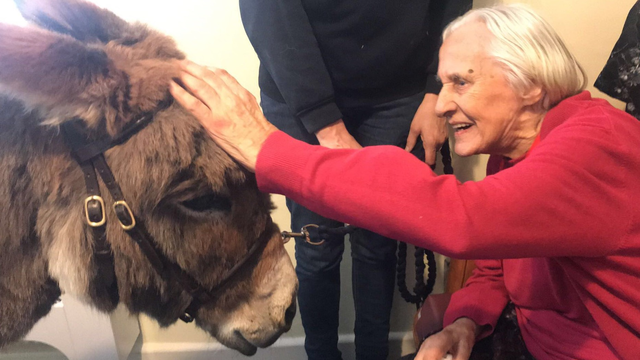
Residents had a special visitor this month when Willow the donkey called in to spend some cuddle time with residents and staff.
Willow is one of the donkeys from Sidmouth Donkey Sanctuary.

Technology plays an increasing role in social care, as it is in many aspects of life. But good care is still largely about human interactions. The key issue for care management systems and other care technologies is how they support those interactions.
At the end of 2017 we rolled out a new care management system across our homes. When we evaluated the options the important questions were around what the proposed solution would mean for our residents and our team.
Our new real-time mobile care management software brings complete transparency. Care activity reports track delivery against each resident’s digital care plan, including an audit trail for all fluids, nutrition and medicines. Events and inputs are logged as they happen so there is one, constantly updated source of information about the care each resident receives.
Where, for example, nutrition or fluid intake needs to be adjusted the system can automatically calculate and record the required changes. Because all of this happens efficiently there is more time for our care team to interact with residents and ensure we are looking after their overall wellbeing.
Because data is so easy to collect, we can use more of it. Procedures are driven by individual care plans and aligned with CQC standards. This means we have consistent and comprehensive care reporting records for each resident and can reinforce best practice continuously.
External Links
The care management system is intelligent and synchronises with the pharmacy to ensure medications are administered correctly, sourced cost-effectively and always available.
Secure external links are provided so that digital care plans and information can be shared with health professionals to streamline patient care. Family members also have a secure gateway so they can input suggestions to the care plan and see what is happening with the wellbeing and care of their relative.
Benefits
The system helps staff work more efficiently and to deliver better care. There’s more time for carer and resident interaction and more control for the service users and their relatives.
The transparency that comes with realtime care tracking has several advantages:
The technology is helping us to work more efficiently and provide the best care possible. It also gives family members important reassurance that their relatives are being well cared for and encouraged to lead an active and fulfilling life.
Find out more about how we use technology to track and improve the care we deliver.
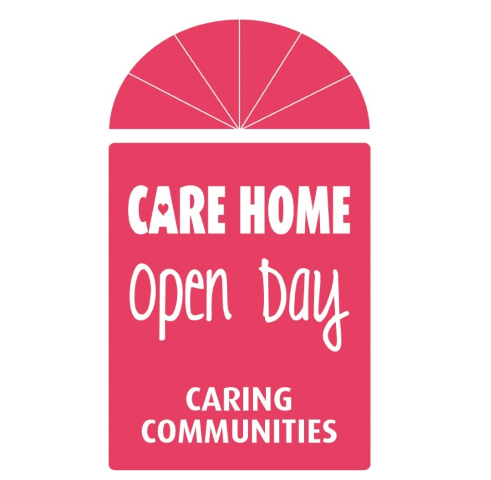
Altogether Care will be taking part in National Care Home Open Day this Saturday 21st April.
The nationwide Open Day event is a chance to celebrate all the different people, cultures and relationships in local areas, and show the community that care homes are friendly, happy and exciting places to be.
Our Care Homes – Sherborne House in Yeovil, Steepleton Manor near Dorchester, and Weymouth Care Home will open their doors this Saturday with an array of activities, information and events available.
Activities include:
And much more- so what are you waiting for? Come along and meet our residents and staff and to find out why we have been supporting the local community for 30 years.


Some challenges are too big to tackle on your own. And taking care of the increasing care needs of an ageing population is probably as big a challenge as you can ask for. But what sort of social care partnerships would be needed to deliver a sustainable solution?
Currently we have too many older people stuck in hospital beds because there is no suitable care they can be transferred to. Either that or the process for commissioning that care doesn’t work as well as it should.
While we have more people needing more complex care outside of hospitals we also have care homes closing. Some owners struggle to meet the demands of CQC standards and the expectations of funders and residents and still make even a modest profit to remain viable and re-invest in the changing needs of clients.
Historically, relationships between health services and local authority commissioners, and the largely private organisations that deliver care have been too ‘insular.’ At the same time financial pressures have led to care commissioning being ‘commoditized’ rather than being planned and delivered in partnership.
Thinking Differently
Whatever structures and systems we put in place they can’t be fully effective unless we also create a different culture; one in which we collaborate openly and make the best use of our collective resources and expertise.
Care homes need the input of health specialists to make sure we provide for all the physical, emotional and mental needs of our residents. Supporting a healthy care sector will also help ease the pressure on hospital beds and speed up the transfer of care to either residential or domiciliary provision.
The more we collaborate and communicate the better we will understand each other’s issues and objectives. This is the vital first step towards finding joint solutions and making better use of everyone’s scarce resources.
For care users there should increasingly be one conversation that leads to the right care and support being provided by the right person at the right time. This won’t just improve quality of life it can also save repeated or emergency hospital admissions that further drain resources and cause distress.
In running our care homes in Dorset and Somerset we always remember that we don’t have the monopoly on good ideas. Our culture is to work collaboratively with a wide range of partners in health services and other organisations to meet the diverse needs of our residents, to help them stay happy and healthy.

An open day will take place at Steepleton Manor on Saturday 21st April from 10.30am. Residents will enjoy an art session with Sarah Jane which has an Australian theme and a special buffet will be served with foods from Australia, New Zealand and India.
During the afternoon an afternoon cream tea will be served to mark the Queen’s birthday. Songs with the lovely Christina will start at 2pm and a recruitment and cake stall will be present throughout the day.

Residents at Steepleton Manor enjoyed a Memory Box session last month. Helen got the chance to read an original school annual from 1958, whilst David enjoyed seeing a photo of a Triumph Herald 1959 model. A collection of cards with ‘famous faces’ on also gave residents the perfect opportunity to reminisce.

Steepleton Manor Care Home have collected and donated 40 Easter Eggs to the Wessex FM Easter Appeal. The eggs will be given to local children who would not normally receive an egg.
The care home which is based near Dorchester wanted to collect the eggs so that young people can receive a treat this Easter.

We are delighted to reveal our Employees of the Month for March for each of our care homes. Each month, care home managers at Sherborne House, Steepleton Manor and Weymouth Care Home will hand pick team members who demonstrate a passion for their role and go above and beyond to provide excellent standard of care and support to residents.
Our Employees of the Month for March are:
Sherborne House
Linda Vitina

Linda always has a smile and a friendly greeting for everyone. She is liked by all and nobody brings up the whites as good as Linda!
Weymouth Care Home
Kayleigh Phillips

Kayleigh is a valuable asset to the team and tackles many challenges within her role.
Steepleton Manor
Adriana Panta

Adriana has great dedication to her job as a nurse, she is always happy and the residents enjoy her company.
Congratulations to all Employees of the Month!
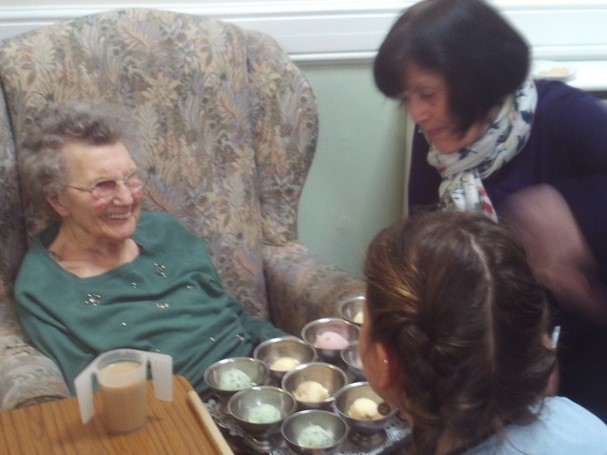
Residents at Weymouth Care Home held a special event to mark National Swallowing Day and to highlight how Dysphagia can affect people’s lives.
An ice cream flavour challenge took place with the winning team guessing the most flavours. Mocktails were also flavour of the day.
Eating, drinking and swallowing difficulties have potentially life-threatening consequences. They can result in choking, pneumonia, chest infections, dehydration, malnutrition and weight loss. They can also make taking medication more difficult and they can lead to a poorer quality of life for the individual and their family. Dysphagia can affect people at any stage of their lives and speech and language therapists support and enable them to eat and drink safely.

Residents at Steepleton Manor are looking forward to Easter and in preparation have been creating various art forms of rabbits.
Sarah Jane visits each month and assists everyone in using a variety of art materials such as water paints and chalks to create drawings and table decorations.

Altogether Care took part in Random Acts of Kindness Day last month on Saturday 17th February. We asked our staff to let us know if they have seen any examples of extraordinary acts of kindness- over and above what we would expect in our day to day roles as part of a caring company.
Taking inspiration from Matt Callanan – wemakegoodhappen.com – our Care Home and Care at Home departments received bright yellow envelopes containing £10 with simple instructions to be distributed around Dorset and Somerset. The rules are simple:
The envelopes encouraged the lucky strangers to be creative, do something lovely, or make someone smile. Below is just one example of how kindness was spread across the South West.
“We have a young homeless girl that we are supporting with our organisation, Second Chance Bournemouth, who desperately needed some new shoes. We doubled the money and bought her a new pair of trainers. We also treated her to some pampering and a set of new clothes with a cash donation from another beautiful soul. It was lovely to see such a smiling happy face on a cold sunny day!”
– Shelley Morris

Residents at Sherborne House enjoyed being pampered earlier this month with facials and massages as part of a pamper session. Heavy snow allowed everyone to have a ‘pyjama day’ complete with hot chocolate and marshmallows.
A visit from Sharandy’s Birds of Prey meant residents got to stroke a beautiful owl. Never a dull moment at Sherborne House!

Residents at Steepleton Manor made the most of the chance to be active this month at their monthly Zumba class with Becky. With such motivational music the residents allowed the beat to guide their feet!

Once a person’s care needs become too extensive to be met by home care visits the next step is often residential care. But it doesn’t have to be. Live-in care offers many people a blend of independence and support that meets their needs better than a care home.
For some, moving into a care home might be too much of an upheaval – settling into a new environment might be disorientating and distressing. This is particularly true for people with dementia who find familiar surroundings and routines comforting. The care home option could mean becoming uprooted from a community and friends. It could mean having to rehome and leave behind a much-loved pet.
Sometimes it’s the perceived loss of independence that makes residential care unappealing; particularly if a person is mentally very active but physically impaired.
How Live-in Care Works
For many, live-in care is an option worth exploring. It involves a care worker living in the person’s home so that they are able to provide round-the-clock support. They can help with personal care, medication, cooking and cleaning or pet care. There’s also somebody on hand for companionship and to reduce the risk of trips and falls.
Live-in carers also support trips out, whether it’s to the doctor, the supermarket or the hairdresser.
For some people the need for more extensive care is temporary, perhaps when they are recovering from illness or an operation. Being able to receive round-the-clock care in their own home for a short period means they can leave hospital without having to wait for a residential place to become available. They can also get back to normality and regain greater independence quickly.
Obviously, the personal relationship is important. As a provider of live-in care we work hard to match the right carer to each service user so that they can meet the full range of needs and get along as people.
Decisions about the most appropriate form of care need a lot of consideration. At ATC we work closely with service users and families to explain the options and help everyone to make the choice that works best. Find out more about our Live-in Care service here, or contact us today on 01202 894 925.

Care home fees are an emotive issue. They can consume a large proportion of the wealth people have spent a lifetime building. This can mean there is much less for relatives to inherit. And, of course, there’s the ‘random’ element that means some older people never need to go into care while others do.
It’s probably not surprising that people question whether the fees being charged are reasonable. In most parts of the country fees are over £651 per week of the 2017 national average. And that’s just for the residential element. Any specialist nursing care will be additional.
Over £33,000 per year may sound like a lot. But perhaps it isn’t if you compare it to the cost of even a fairly modest hotel. In a care home, on top of the accommodation there will be some element of personal care depending on individual needs. This could be help with washing and dressing or safe administration of medication. There will also be meals and laundry.
A care home is also much more than a warm and comfortable place to live. There are activities and outings to maintain physical and emotional wellbeing. There are also qualified staff who can keep an eye on the physical and mental health of residents. Companionship and round the clock help are part of the package.
Regulation and Training
Care homes are not free to deliver whatever standard of care they think appropriate. It is a highly regulated sector. Everything from the way homes are managed to the skills of staff is monitored alongside basic considerations such as hygiene and health and safety. Performance is evaluated by the Care Quality Commission and their judgements are very public.
The training costs to ensure that all staff are suitably skilled and qualified are significant and new regulations and requirements come along all the time.
Quite rightly, the CQC, relatives and society place very high expectations on the way that homes care for their residents. This is as it should be. But it cannot be done for a budget price.
For more information on funding care, take a look at our page here and our direct payments infographic.
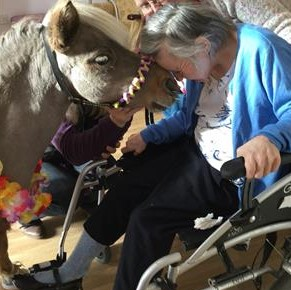
A visit to a Care Home from a miniature horse provided an extra special treat at Sherborne House in Yeovil.
‘Star’ met each of the residents at the dementia home earlier this year, and made a big impression for a little horse.
April Kibby, from Lofty Therapy Horses said, “Each visit throws up new ‘experiences’ which they are ready to deal with and learn from. We bought our first American Miniature Horse called ‘Lofty’ as a companion for a larger horse and thought we would show him. That never happened as we took him to visit my father in law in a nursing home and the rest as they say, is history.
Star is the only female therapy horse and is an American Miniature Horse that was donated to us for therapy use. She came from a farm in Cheshire. She originally came from Texas as a 6-month old foal. She is 8.5 years old and 32 inches high, our smallest therapy horse”.
Miniature horses can live up to 30 years and like regular sized horses enjoy a roam in a field and a warm stable at night.
Lofty has made several TV appearances and continues to visit nursing homes, hospices, nurseries, hospitals and schools.
Special little trainers are made for the horses which enable them to trot around indoors whilst on their visits. They are also trained to go in a lift making them easily accessible to all floors.

We are delighted to reveal our Employees of the Month for February for each of our care homes. Each month, care home managers at Sherborne House, Steepleton Manor and Weymouth Care Home will hand pick team members who demonstrate a passion for their role and go above and beyond to provide excellent standard of care and support to residents.
Our Employees of the Month for February are:
Sherborne House
Michelle Knight

Michelle’s colleagues describe her a breath of fresh air and residents are always come first where Michelle is concerned. She always has a smile and time to catch up with each and every resident.
Weymouth Care Home
Rachel Adams

Rachel is very efficient and has time for everyone. She is cheerful and takes on any challenge that comes her way. She is a great asset to the team and for the residents.
Steepleton Manor
Dawn Anderson

Dawn is always happy and full of enthusiasm. She is dedicated to working hard and makes a huge difference to the team and all the residents.
Congratulations to all Employees of the Month!

The simple truth is that in most cases you don’t need to be particularly wealthy before you become responsible for funding your own care. It is wise for everybody to think about this eventuality in advance and have a plan for how care would be funded if necessary.
If you have assets (including your home, savings, shares etc) and income (including pensions and benefits) worth more than £23,250 you will be a self-funder and expected to pay for all of your care. In the case of residential care this can be several thousand pounds per month.
If your assets fall below this level, and you have been formally assessed as needing care, the local authority will become responsible for funding some of your care. If your assets fall below £14,250 the local authority will be responsible for funding all of your care.
The above thresholds apply to England. Different values apply for Scotland, Wales and Northern Ireland.
You should also bear in mind that the contributions from local authorities may not cover the full costs of your preferred care home.
Exceptions
If your spouse or civil partner will continue living in your property after you go into residential care the property will not be counted among your assets. The property value may also not be counted if the home remains occupied by a close relative over the age of 60, a dependent child or a relative who is disabled or incapacitated.
Deferred Payment
For many people their home is their single largest asset and will ultimately fund their care. Local authorities are obliged to offer deferred payment. This means that they will take over immediate responsibility for funding care and then recover the cost when your property is sold, which may be after your death.
Some people choose to use an equity release scheme or to use the value of their home to fund an insurance or endowment scheme to pay for their care. You should always take professional financial advice before choosing these options.
Care Cost Cap
From 2020 the total amount any individual is expected to pay towards their care will be capped. The precise arrangements are not clear but the figure being discussed is £72,000. However, this only covers ‘defined care’ and not accommodation or living costs. Costs incurred before the cap is implemented will also not count. The implementation of the cap may make little practical difference for many people.
There are not many opportunities to limit your liability for care costs. You cannot simply give your assets away, for example. But it can reduce a great deal of anxiety if you know what your options are and have thought through what you are going to do.
We recommend you take professional advice from a specialist law firm if you are thinking about self-funding your care.
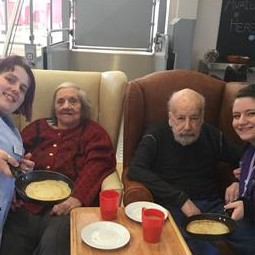
Residents at Sherborne House Care Home tucked into over 30 pancakes to celebrate Shrove Tuesday earlier this month.
Toppings were plentiful and included Golden Syrup, Chocolate and Fresh Fruit. The favourite one was however, traditional Lemon and Sugar.

Residents and staff enjoyed a sing-along when ‘Country Dave’ performed some much loved Country and Western songs at Sherborne House recently.
Dave will be visiting again soon and was a big hit with residents and staff!